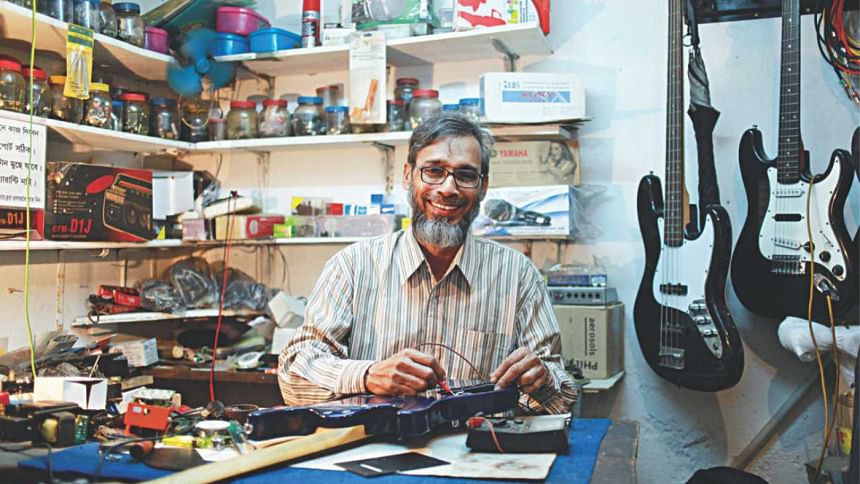STRINGS, KNOBS AND ROCK AND ROLL

In the sixties, thanks to a couple of self-taught musicians, our country took its first steps towards rock and roll music. This genre was completely new to the people at the time and was practised by just a handful, mostly expat communities. After the 1971 Liberation War, however, it took off – bringing us legendary artists and bands such as Azam Khan, Souls, Pilu Momtaz, Happy, Lucky Akhond, among others.
The man I want to talk about today is someone who has played a very important role in this musical uprising. To this day he is considered a living legend in the music community – yet he doesn't sing or play any instrument. Abdur Rafique – known as the first true roadie, the first guitar technician, a musician's doctor, the real life MacGyver – is the oldest music technician of Bangladesh.
In the early sixties, around the same time that Bangladesh Television started its broadcast, Rafique began his life as a technician. “There was an institute in Elephant Road where one could learn the basics of electrical engineering, repairing radios and such. Coming from a lower middle class family, I had to drop out after finishing my intermediate exams to help pay the tuition after I got admitted to this institution,” says Rafique.
His first job as a technician led him to become one of the handful of television repairmen in Bangladesh. “At that time television wasn't a household item. There were maybe one or two televisions in a single neighbourhood. I remember when we used to go repair televisions in a not-so-modern neighbourhood; people used to gather around to see us. The television itself was an amazement to them and the people who repaired them were no less of a deal. One can say that was my first and last experience of fame,” Rafique states.
Meanwhile, the rock music scene started to make its way into the mainstream as artists like Azam Khan, Ferdous Wahid, Pilu Momtaz emerged. “More and more amplifiers and speakers were being imported, and alongside my TV repairing gig, I started to fix speakers,” Rafique recalls. One day, Rafique was given an unconventional job of repairing a keyboard. “It was a keyboard of the famous group Zinga Goshty. A very sci-fi looking instrument, if I can say so myself. The keyboard had a tape machine built in, and there was an antenna to grab the mic signal. I took a look at it and within two to three days, I was able to fix it. I thought it was no big deal and took the instrument as a general electronic device, but this particular job opened all kinds of doors for me,” he says. At the time, you had to send your keyboard to Japan or India to get it fixed, and so it was a pretty big deal when word got around that Rafique, a Bangladeshi, had fixed a keyboard.
“Goutom da of Surasree (a famous musical instrument store) was the first one to suggest I open up a shop to repair musical instruments,” says Rafique. “I had my doubts, but after being persuaded by a bunch of musicians, I opened up my little shop and named it Rafique Electronics.” The same shop still lies in the corner of science laboratory where Rafique works his magic.
Till the late seventies it was still mostly keyboards and amplifiers for Rafique. “I remember one of the first guitars that came into the shop was owned by the legend Happy Akhond. It was an American Fender Stratocaster. Wonderful rosewood finish. To tell you the truth, I was quite scared to work with this guitar because at that time instruments such as these were very expensive,” claims Rafique. “After finishing the job, I felt an unusual confidence within me. Happy was very pleased with the work and he recommended some of his friends to come by the shop with their guitars which somehow led to where I am now.”
Since that day, Rafique has been known as the 'guitar doctor'. From primary guitar players to legends such as James and Ayub Bachchu, various artists have been to Rafique's guitar den. “I was always a big fan of music and before I even knew it, I was at the centre of the music industry. Talents such as Kamal, Niloy Das, and Labu have walked through that door and it still surprises me how lucky I am to have a cup of tea with these musicians,” beams Rafique.
After all these years, Rafique is now slowly trying to close shop. “The truth is I have been trying to retire, but musician friends are the ones who have been stopping me from doing so. I am not getting any younger and to be honest it's a strain to work hours on end. I have already stopped repairing keyboards as my body doesn't allow it, and who knows, maybe after a year or two, I will finally head towards retirement.”
Retirement or not, Abdur Rafique's name will forever be alive within the country's music community. A true rock star, Abdur Rafique, despite being on the sidelines of the industry, has made enormous contributions. If there was a rock and roll Hall of Fame in Bangladesh he would have had a place in it along with the crème de la crème of the music industry.

 For all latest news, follow The Daily Star's Google News channel.
For all latest news, follow The Daily Star's Google News channel. 



Comments